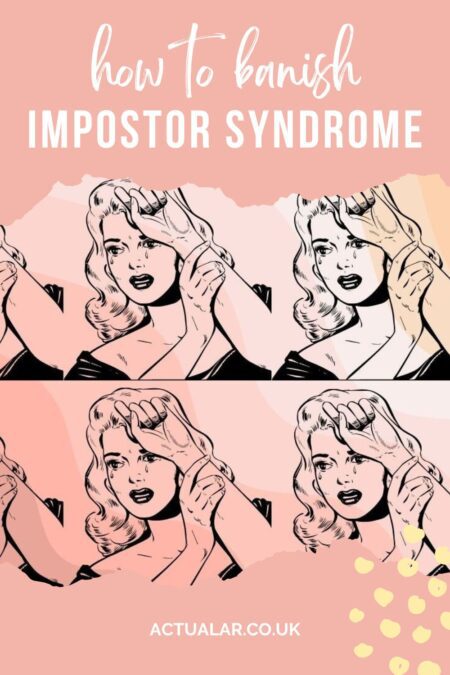Starting out on your freelance career is scary. There are no two ways about that! It’s sometimes scarier when you’ve been doing it a while and things start to slow down, too. How do you keep putting yourself back out there? What’s the best way to gain and retain a client base? And crucially, how can you do those things when you’re dealing with the dreaded imposter syndrome?
In this post, I’m going to look at this, most detrimental of issues for freelancers. Imposter syndrome is something that I’ve dealt with my entire freelancing career. If I’m being honest, it’s something I’ve always dealt with – long before I started working for myself. If you’ve no idea what I’m talking about then I am genuinely happy for you! However if, like me, you’re somewhat naturally inclined towards imposter syndrome, then hopefully this post will be helpful for you.
What is imposter syndrome, anyway?
Despite its fairly self-explanatory name, imposter syndrome is a complex issue. To try and define it loosely, imposter syndrome refers to an inner belief that you’re not as competent or deserving as others perceive you as being. In a nutshell, we’re talking about self-doubt. However, this is a deeper level of self-doubt that can seriously affect your success as a freelancer.
The thing about imposter syndrome is that the feelings of self-doubt and disbelief at your own skills and/or intelligence tend to persist in spite of clear evidence that you can, in fact, do your job well. It’s a feeling of fraudulence, and it’s quite hard to shake off. Especially if you’re breaking into an industry that you may not have sufficient ‘on paper’ expertise in.
Imposter syndrome can affect anyone, in any career. This internal conflict between your own self-perception and the way others view you as being capable and efficient can become a real problem if not dealt with carefully. It can lead to major consequences on both a personal and professional level.
Consequences of imposter syndrome
Due to the internalised fear and doubt of your own skills and talents, imposter syndrome can have a real negative impact. For example:
- You’ll put extreme pressure on yourself to ‘get it right’ or ‘do better than before’ to try and validate your work efforts
- You’ll end up going above and beyond what your client expects (and has probably paid for) because you feel like you have to prove yourself to them
- You’ll feel like you don’t deserve any positive feedback because you don’t value your own contributions
- You’ll rarely share or celebrate your work publicly because you think others will see right through you for being a fake
- You’ll pick faults with all of your work and criticise yourself despite your clients being more than happy with the job you’ve done
- You’ll always feel like you’re about to be ‘found out’ and then constantly worry you’ll have to ‘go and get a proper job’
These are just a few of the potential issues that imposter syndrome can cause. Do any of them sound familiar? For many of us, it can be difficult to establish and maintain a sense of self-confidence in your work, particularly when you’re self-employed. Over time, these feelings can lead to a toxic cycle of anxiety, guilt, a sense of shame and even depression, so it’s important to try and tackle them.
Does it apply to freelancers?
Many of us freelancers come to our respective career paths after trying out the more conventional ones. Consequently, it’s somewhat natural to feel out of your depth or that you’re underqualified when you may not have had formal education or work experience in your field.
The truth of the matter is that we’re probably perfectly capable. However, the negative self-perception that comes with this syndrome can really stop us from fulfilling our potential.
Being confident enough to put yourself out there and pitch for work is hard. It’s not easy to stand out in the freelance market, so it’s even harder if you’re fighting an internal battle with a voice that says you’re not good enough anyway!
In addition to this is the newfound responsibility for managing your own workload. It’s down to you to generate the work to ensure your bills are paid. That’s a lot of external pressure to compound the internal stress you may be feeling as a freelancer.
It’s not all doom and gloom though. In my own, ongoing battles with self-doubt, I’ve learned a few things that could help you banish imposter syndrome. There’s no quick fix, but for those more prone to negative self-perception, here are some steps to start you on the ongoing process of eliminating the imposter vibe.

Ways to get rid of feeling like an imposter
One of the most important things to acknowledge here is that this is a process. Negative self-perception isn’t something people pick up overnight. It’s often the result of a long (often lifelong) experience of someone’s identity. As a result, it’s crucial to treat the process of breaking this habit as a long game.
Identify and try to understand your feelings
First and foremost, you need to address your negative thoughts and ideas. Getting them out into the open, instead of whirling around in your head, can help make them feel less huge. If you wanted to, you could write them down or share them with someone you trust. What matters is to air them, make them tangible. That way, you know you’ve got something to work on going forward.
Map your feelings to the facts
If you’ve identified your negative thoughts and feelings, now you should look for ways to challenge them. Again, you could do this on your own or with someone you trust. The important thing is to find evidence that challenges and disproves your negative thoughts.
If you think you’re not really very good at what you do, look for an example of a satisfied customer. What did they think of your work? What was their positive feedback like? Find the proof that you actually are capable, talented and skilled. Prove yourself wrong!
Discuss it regularly with people you trust
It’s really important to build positive connections. They may be in the real world, such as family or friends. They may also be with fellow freelancers or colleagues. What is key though, is to regularly share your thoughts and issues so that you can be supported in changing your self-perception.
It goes without saying that you’d do the same for someone else who was going through it too, I’d hope! With regular reassurance, you’ll find that your confidence will slowly grow over time, and you’ll begin to feel less of an imposter.
Comparison is the thief of joy
Above all, resist the urge to compare yourself to others. It’s really easy to look at what someone else is doing and then torment yourself for not being as good as them. Ultimately though, that’s incredibly unhelpful and just compounds your negative self-perception.
Also, you’ve got to remember that appearances can be deceiving. What looks like another person’s success could be causing them a lot of strain or difficulty too. Try not to focus on the supposed achievements of others, and look for the small wins you can make each day instead.
You shouldn’t feel like one in the first place
The bottom line here is that none of us should feel like fakes or frauds. Everyone in the freelance space is doing their best to provide a service and earn a living. Imposter syndrome can be a consequence of that, but we don’t need to let it define us or cause us problems. I’ve found that there are those out there who will want to work with you because they value who you are; that’s priceless.
Being successful does not mean being perfect. If you feel that you must work to a standard of perfection in order to validate your efforts, you’ll burn out fast. It’s hard, especially if you’re naturally hardwired towards self-doubt, but it is possible to overcome imposter syndrome. In fact, making an ongoing effort to banish it is probably one of the best things you can to do boost your freelance career.
Useful resources
Here are some short video resources I’ve found helpful when working on my own issues with imposter syndrome. Remember, it’s a marathon, not a sprint! Hopefully, some of these will be helpful; let me know in the comments if you’ve found any to be of interest.
Do you struggle with imposter syndrome?
I’d love to know what your thoughts are on this topic. Imposter syndrome can affect anyone, regardless of your profession. If you’ve been feeling this way then I’d love to hear from you. I honestly think that the more we discuss it as an issue, the less overwhelming it may feel for us as a digital community.
Let me know in the comments below. If you’ve found this post helpful or interesting, I’d love it if you’d give it a share or pin it on Pinterest.

Support Me
As always, my posts on Actual Ar are free to enjoy and hopefully of interest to you, but if you’d like to support me for any reason then you can buy me a cuppa here, and alongside the supporter-only goodies I post on Ko-Fi, you’ll also have my everlasting gratitude, love and devotion. So that’s nice.



